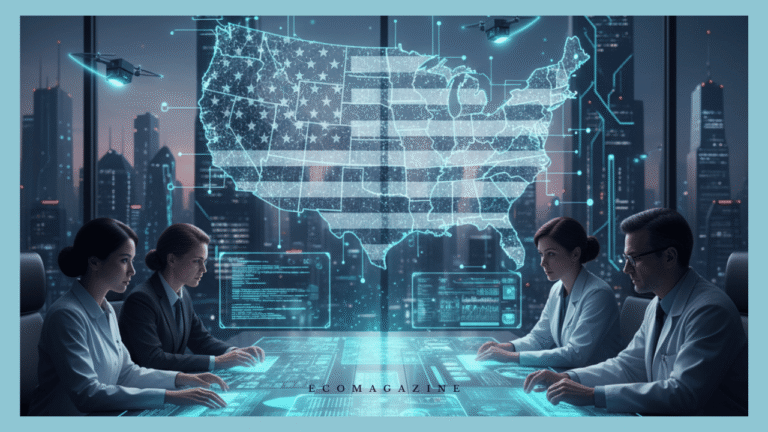When it comes to shaping the future of technology, the United States holds a dominant position on the global stage. The country’s advancements in artificial intelligence (AI) and machine learning (ML) have set new standards for innovation, efficiency, and creativity. Across industries, from finance and healthcare to entertainment and education, Americans have fully embraced the potential of AI-driven systems.
Generally, the U.S. continues to lead the charge toward creating intelligent solutions that make life easier and business smarter. This article explains why America has emerged as the global leader in artificial intelligence and machine learning, exploring its research ecosystem, investments, policies, and overall technological landscape.
Strong Research and Innovation Ecosystem
At the heart of America’s leadership in AI is its robust foundation in research and innovation. Prestigious universities such as the Massachusetts Institute of Technology (MIT), Stanford University, and Carnegie Mellon University have long been pioneers in AI development. Their advanced programs and laboratories consistently produce groundbreaking discoveries that influence the direction of global research.
For example, MIT’s Computer Science and Artificial Intelligence Laboratory and Stanford’s Artificial Intelligence Lab have developed key technologies in modern AI applications. In addition, research organizations such as OpenAI and DeepMind USA are continuously pushing the boundaries of what AI can accomplish. This progress is supported by both government initiatives and private investments that inject billions of dollars into the sector annually. The combination of financial support and high-level expertise keeps the U.S. research ecosystem ahead of global competitors.
Entrepreneurial Spirit and Startup Culture
The United States has always been known for its entrepreneurial mindset, and this spirit is particularly strong in the AI sector. Thousands of AI and ML startups are launched every year, each introducing unique solutions across industries like healthcare, retail, and finance. For example, startups such as UiPath, known for automation, and Databricks, focused on data engineering, are great examples of American innovation reaching global impact. Organizations like Y Combinator and Techstars play an essential role by providing funding and mentorship to early-stage startups. The combination of investment, creativity, and risk-taking fosters an environment where AI ideas flourish, helping the nation maintain its technological edge.
Artificial intelligence has also made its way to online entertainment platforms. The best online casinos in the USA now use AI systems to enhance user experience, detect fraudulent behavior, and personalize gaming recommendations. Machine learning tools help these casinos understand player preferences and create safer gaming environments. Additionally, chatbots powered by AI are now being used to offer effective and highly responsive customer support.
Availability of Top Talent
Talent is a key factor that keeps the U.S. ahead in artificial intelligence. American universities produce thousands of AI specialists every year, while visa programs like the H-1B allow companies to recruit global experts. This inflow of international talent enriches the country’s innovation culture. Silicon Valley continues to serve as a magnet for world-class engineers, scientists, and developers. Other cities, including Boston, Seattle, and New York, have developed into important AI hubs where research and business intersect. Notably, the abundance of skilled professionals, combined with competitive pay and strong career opportunities, ensures that AI and ML projects in the U.S. have the brightest minds driving them forward. This unmatched talent pool fuels creativity and sustains the country’s leadership in the field.
Government Support and Strategic Policies
The U.S. government plays a crucial role in supporting AI development through comprehensive policies and initiatives. Acts such as the U.S. AI Initiative and the National AI Research Institutes ensure that innovation aligns with ethical standards and public interests. The American AI Initiative emphasizes research, workforce training, and international collaboration, strengthening the country’s ability to compete globally. By funding AI education and encouraging partnerships between public and private sectors, the government promotes responsible innovation. These strategic policies ensure that artificial intelligence continues to evolve in ways that benefit both society and the economy.
Diversity of Applications Across Industries
AI’s impact in the United States extends across nearly every sector. In healthcare, AI aids in disease diagnosis, drug development, and patient care. Financial institutions use machine learning to detect fraud, improve risk assessments, and guide investment decisions. Retailers apply AI for customer analytics, stock management, and trend forecasting. For example, IBM’s Watson assists in medical diagnosis, Goldman Sachs utilizes AI for predictive trading, and Walmart employs AI-driven logistics to manage its massive supply chain. This diversity of use cases highlights how AI has become an essential part of daily operations across industries.
Academic and Corporate Collaborations
The close partnership between academic institutions and private corporations further accelerates America’s AI progress. Universities often collaborate with companies to conduct real-world research and develop new technologies. For example, Google supports AI programs at Stanford, while Microsoft works with MIT on ethical AI initiatives. These collaborations allow students and researchers to test theories in practical environments, leading to innovative products and solutions. This synergy between academia and business strengthens both research outcomes and commercial applications, reinforcing the country’s leadership in artificial intelligence and machine learning.
Access to Big Data and Computational Resources
Lastly, the U.S. holds a significant advantage when it comes to access to big data and advanced computing resources. American multinational corporations manage vast datasets, which are critical for training AI models. Cloud computing platforms such as Amazon Web Services (AWS), Google Cloud, and Microsoft Azure provide the computational power necessary for large-scale machine learning. For instance, OpenAI uses Microsoft Azure to train its GPT models, while social media platforms like Facebook and Instagram generate real-world data that enhances AI learning capabilities. The combination of extensive data access and powerful infrastructure keeps the United States far ahead of other nations in developing advanced AI systems.


